
Messier 100 is a grand design intermediate spiral galaxy in the southern part of the mildly northern Coma Berenices. It is one of the brightest and largest galaxies in the Virgo Cluster and is approximately 55 million light-years from our galaxy, its diameter being 107,000 light years, and being about 60% as large. It was discovered by Pierre Méchain in 1781 and 29 days later seen again and entered by Charles Messier in his catalogue "of nebulae and star clusters". It was one of the first spiral galaxies to be discovered, and was listed as one of fourteen spiral nebulae by Lord William Parsons of Rosse in 1850. NGC 4323 and NGC 4328 are satellite galaxies of M100; the former is connected with it by a bridge of luminous matter.

Coma Berenices is an ancient asterism in the northern sky, which has been defined as one of the 88 modern constellations. It is in the direction of the fourth galactic quadrant, between Leo and Boötes, and it is visible in both hemispheres. Its name means "Berenice's Hair" in Latin and refers to Queen Berenice II of Egypt, who sacrificed her long hair as a votive offering. It was introduced to Western astronomy during the third century BC by Conon of Samos and was further corroborated as a constellation by Gerardus Mercator and Tycho Brahe. It is the only modern constellation named for a historic person.

Messier 88 is a spiral galaxy about 50 to 60 million light-years away from Earth in the constellation Coma Berenices. It was discovered by Charles Messier in 1781.

Messier 99 or M99, also known as NGC 4254 or St. Catherine's Wheel, is a grand design spiral galaxy in the northern constellation Coma Berenices approximately 15,000,000 parsecs from the Milky Way. It was discovered by Pierre Méchain on 17 March 1781. The discovery was then reported to Charles Messier, who included the object in the Messier Catalogue of comet-like objects. It was one of the first galaxies in which a spiral pattern was seen. This pattern was first identified by Lord Rosse in the spring of 1846.

IC 755, also known as NGC 4019, is a barred spiral galaxy. It lies about 60 million light-years away in the northern constellation of Coma Berenices. It is a member of the Virgo Cluster.

NGC 4498 is a barred spiral galaxy located about 50 million light-years away in the constellation Coma Berenices. NGC 4498 was discovered by astronomer William Herschel on March 21, 1784. NGC 4498 is a member of the Virgo Cluster.
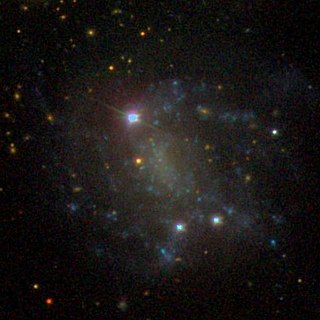
NGC 4523 is a Magellanic spiral galaxy located about 35 to 50 million light-years away in the constellation Coma Berenices. It was discovered by astronomer Heinrich d'Arrest on April 19, 1865. NGC 4523 is a member of the Virgo Cluster. A distance of for NGC 4523 was derived from using yellow supergiants in the galaxy as standard candles.

NGC 4540 is a spiral galaxy with type 1 Seyfert activity located about 64 million light-years away in the constellation Coma Berenices. NGC 4540 was discovered by astronomer William Herschel on March 21, 1784 and is a member of the Virgo Cluster.

NGC 4222 is an edge-on spiral galaxy located about 60 million light-years away in the constellation Coma Berenices. It was discovered by astronomer William Herschel on April 8, 1784 and is often misidentified as IC 3087. NGC 4222 is a member of the Virgo Cluster and is a companion of NGC 4216 which lies about 180,000 ly (56 kpc) away. Despite this, the two galaxies are not interacting.

NGC 4302 is an edge-on spiral galaxy located about 55 million light-years away in the constellation Coma Berenices. It was discovered by astronomer William Herschel on April 8, 1784 and is a member of the Virgo Cluster.

NGC 4307 is an edge-on spiral galaxy located about 65 million light-years away in the constellation Virgo. It was discovered by astronomer Christian Peters in 1881 and is a member of the Virgo Cluster. It is also a LINER galaxy.

NGC 4316 is an edge-on spiral galaxy located about 70 million light-years away in the constellation Virgo. It was discovered by astronomer Wilhelm Tempel on March 17, 1882. NGC 4316 is a member of the Virgo Cluster and is classified as LINER and as a Seyfert galaxy.

IC 3971 is a spiral galaxy located approximately 1 billion light-years away from the Solar System, in the constellation of Coma Berenices. It was first discovered in January 1904 by German astronomer Max Wolf. According to SIMBAD database, it is a LINER type galaxy with an active nucleus.

IC 3528 is a Seyfert 1.5 type spiral galaxy with X-ray emission located 660 million light-years away in the constellation of Coma Berenices. It lies near to spiral galaxy NGC 4540, although the two of them are quite far. The object was discovered by Royal Harwood Frost on May 7, 1904. Although listed as a member in the Virgo Cluster Catalogue as VCC 1593, it is not a member of the Virgo cluster but a background galaxy.
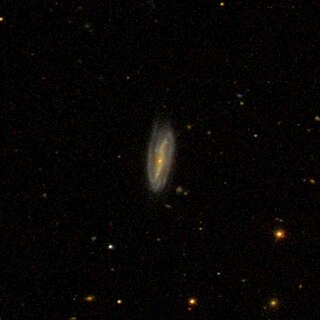
IC 3505 is a barred spiral galaxy located 640 million light-years away from the Solar System in the Coma Berenices constellation. With an apparent size of 0.95 by 0.35 arcmin, IC 3505 has an estimated diameter of 170,000 light-years, making it slightly larger compared to the Milky Way. It is categorized as a LINER galaxy with an active galactic nucleus emitting weak emission-lines.
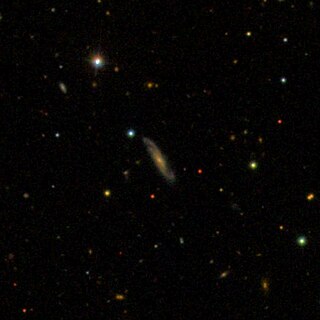
IC 3031 known as PGC 92941, is an edge-on spiral galaxy located in the Coma Berenices constellation. The galaxy lies 1.15 billion light-years away from the Solar System and has an estimated diameter of 240,000 light-years meaning it is bigger compared to the Milky Way. IC 3031 was discovered by astronomer Royal Harwood Frost on May 7, 1904.

IC 4040 is a type SABc spiral galaxy with a bar in Coma Berenices. It is located 353 million light-years away from the Solar System and has an estimated diameter of 105,000 light-years making it slightly larger than the Milky Way. IC 4040 was discovered on April 12, 1891, by Guillaume Bigourdan and is a member of the Coma Cluster.
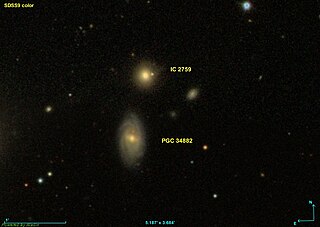
IC 2759 is a small type E elliptical galaxy located in the constellation of Leo. It is located 350 million light-years away from the Solar System and was discovered on April 24, 1897, by Guillaume Bigourdan. Sometimes IC 2759 is confused with the spiral galaxy, PGC 34882 which is located south of the galaxy.
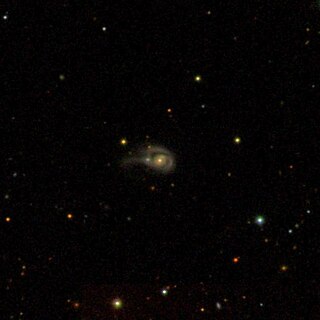
IC 3275 is a spiral galaxy with a ring structure located in the Virgo constellation. It is located 811 million light-years away from the Solar System and has an approximate diameter of 120,000 light-years across. IC 3275 was discovered on May 7, 1904, by Royal Harwood Frost.

IC 3622 also known as PGC 3793395, is a large barred spiral galaxy located in constellation Coma Berenices. It is located 980 million light-years from the Solar System and has a diameter of 175,000 light-years. IC 3622 was discovered by Royal Harwood Frost on May 7, 1904.




















